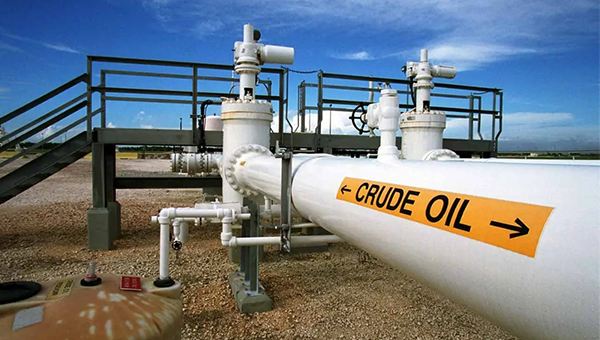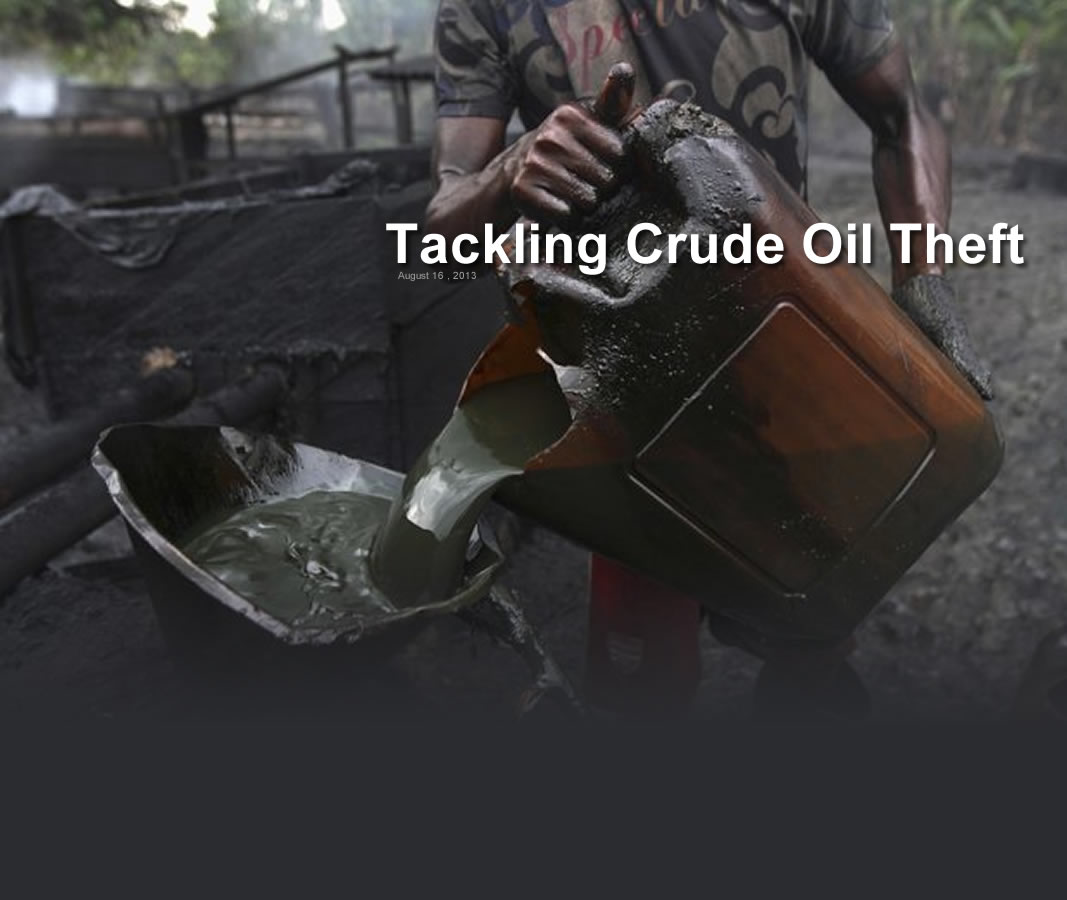Executive Summary
"Stealing, of course, is a crime and a very impolite thing to do. But, like most impolite things, it is excusable under certain circumstances. Stealing is not excusable if, for instance, you are in a museum and you decide that a certain painting would look better in your house, and you simply grab the painting and take it there. But if you were very hungry and had no way of obtaining money, it would be excusable to grab the painting, take it to your house, and eat it." ― Lemony Snicket, The Wide Window
What is the best way to stop thieves from breaching the doorways of a house? Hand over the keys to the castle! Of course, this would be ludicrous in many contexts, but it stretches the debate on curbing crude oil theft in Nigeria's excitable Niger Delta. Notably, this report used the concepts of crude oil theft and illegal oil bunkering differently. While crude oil theft is conceptualized in the report as the illegal appropriation of crude oil from oil companies' pipelines, illegal bunkering is conceptualized as illegally loading stolen crude oil into ships.
Nigeria's fiscal structure and statutes place mineral resources, including oilfield ownership, in the federal government's laps even though state governments issue the rights to landownership through certificates of occupancy (C of Os) or Deeds of Assignments. In other words, in Nigeria, the land belongs to the state governments, but mineral resources within it belong to the Federal Government; the logic creates minefields of conflicts.
Not only do the strange land title and resource ownership laws produce a socio-political behaviour that pits the federal and state governments against each other, but it also produces a sense of alienation for people living in mineral-producing belts.
The absence of a direct link between the economic growth and development of mineral-producing areas and the exploration, production, and sale of mineral resources in their communities strips the activities of their legitimacy in the eyes of the local population. Further, it stirs up narrow and aggressive nationalism as the communities fight against perceived "exploitation." The problem is not just greed but entitlement. Communities and their leaders believe they should benefit adequately from mineral resources on their lands. They are not wrong, but the case for equity cannot justify theft.
Communal perceptions of being short-changed spur actions that lead to "self-help," where wealthy individuals gain the support of communities to exploit the resources for individual and collective gains. Observers note that former regional insurgent leaders have transmuted into either leading oil pipeline vandals or owners of unregistered smoke-belching "modular" refineries. What happens in the Niger Delta occurs in the solid mineral-producing parts of the North, where foreign and local cartels engage in illegal artisanal mining of precious metals.
The Big Boys Playground
Crude oil theft in Nigeria's Delta area is not the casual roguery of a ragtag band of militants but a well-structured and coordinated criminal enterprise. The enterprise comprises a network of highly placed individuals from different walks of life, from the military to politics, commerce, and banking. The players are entrenched, ruthless, and unforgiving. The oil vandals' vast connections and deep pockets make them formidable and explain the difficulty in dislodging them.
The prominent role of non-state actors in crude oil market disruption will not be ended by the finer points of fiscal economics alone; it would require the political firmness and commitment of the federal government to take on the illegal local oil cartels. Unfortunately, this outcome is far-fetched. Oil pirates and their political associates are pod partners. Rich oil vandals support the funding of election campaigns of politicians who would be remiss in supporting any decisive government action that would adversely affect the interests of their electoral piggy banks. The complex relationship between politicians, illegal oil bunkers, and local oil communities makes a firm resolution of the problem more improbable than impossible.
Curbing crude oil theft would require political will, which is in short supply. With political will, the country would have seen geospatial technology, high-impact drones, and sweeping ground forces combine to create a canopy of forceful correction. The orchestrated interplay between technology and troops would have translated into higher official oil output, higher fiscal earnings, and more considerable private sector investment. The elite conspiracy to allow crude oil theft to breed and flourish reflects the integrity gap in governance at all levels.
In the short term, the politics of crude oil theft trumps the economics of national survival. However, refusing to address the crude oil theft problem frontally will do the economy and lead to social unrest that may be difficult to contain as income disparity and poverty lead to a mass movement of the unemployed and socially marginalized.
The federal government has shown a more significant desire to combat oil piracy in recent weeks. The Nigerian Navy recently shut down fourteen illegal refineries in the Niger Delta area and is on the hunt for more. Knowing if this is a sop to local elites who are heavily invested in the sector and bleed losses from the activities of vandals or a genuine attempt at stopping oil piracy is yet to be seen.
Observers are keen on seeing the outcome of the power play between the federal government and oil pirates. The broad notion is that the activity will continue if the underlying economic returns of vandalism compensate for the risk of oil piracy. The more powerful and forceful the government is in confronting the problem, the better the outcome for Nigeria's fiscal situation and the longer-term sustainability of the sector (see illustration 1 below).
Illustration 1: Nigeria's Crude Oil Theft Headache-The Power Matrix
Closing the Leaky Oil Valves
To stop oil vandals would require a combination of public policy, market action and military operations to checkmate vandals and artisanal refiners. Domestic modular oil refiners have complained about the inability to obtain feedstock for their refineries, making the business unprofitable and unsustainable.
In this situation, local refiners are at the mercy of oil pirates, who plug the gaps created by the absence of official supplies. Some operators allege that the shortage or lack of official supply is forcing them to patronize unofficial supply markets in which government officials have an ownership interest. In places like Arepo, in Ogun State, for example, nondescript tankers pass in a daily convoy from pipeline locations passing through the southern riverine boundaries of the 'Journalist Estate' on alleged "orders from above."
Drone surveillance and daily geospatial analysis of oil supply 'drift' would estimate the quantity of oil illegally ferried from different locations. The data gathering would enable security forces to intervene efficiently, effectively, and decisively. The giant elephant in the room is the political will required to break the back of the private oil lords.
With the network of beneficiaries of Nigeria's crude oil theft allegedly cutting across a broad section of collective interests and influential urban elites, fending off the local oil mafia would be a study in asymmetric economic warfare. The combination of national security concerns and international oil price movements presents a rich mix of potential outcomes (see illustration 2 below).
Illustration 2: Nigeria's Crude Theft Headache-Oil Price/Security Pain Matrix
Closing leaky oil taps of illegal activities would require some quick and dirty fixes and longer-term solutions:
Quick and Dirty Fixes
- Regular aerial (geospatial) surveillance of oil-producing areas to assist production audits
- Community incentives to "see-and-tell." should be arranged and sustained
- Ground special forces to ensure the neutralization of illegal bunkering activities
- Arrest and prosecution of pipeline vandals and illegal local oil refiners
- Tighter West African sub-regional border controls
Longer-term Fixes
- Removal of domestic petroleum subsidy to reduce the incentive to vandalize oil pipelines and ferry products across sub-regional borders
- Pivot away from fossil fuel to clean energy alternatives
- Rehabilitate the four local NNPC refineries
- Financially "securitize" pipeline assets
- "White products" distribution tankers without approved tracking codes should be stopped from distribution by the regulatory authorities
- Fuel stations and downstream operators should not be allowed to own mid-stream infrastructure. Keeping Chinese walls would reduce the opportunities for smuggling and simplify industry supply audits.
Plugging the loopholes in the local oil production value chain will not be a walk in the park but a problematic, grimy, and gritty slog through the policy and execution trenches. Solving complex problems is never easy, no matter how pleasant the outcomes are.
This report, in six (6) sections, highlights the cost of the loss of revenue from oil theft, shut-ins, illegal bunkering, off-bar oil sales, and cross-border diversions. It points to the fiscal damage done by oil theft and the accompanying environmental degradation that adds a further national cost from the activities of oil pirates. It seeks to establish the case for a maritime strategy as a basis for a sovereign response and an opportunity for building the blue economy.
Section 1 introduces the report in an inverted pyramid structure. It reviews the state and trends in the global oil market, noting: Oil remains the dominant energy source in Africa, Europe, and the US. At the same time, natural gas dominates the energy mix in Eastern Europe, Asia, and the Middle East, accounting for over 50% of this energy mix in the regions. Coal has also remained dominant in the Asia Pacific region. The share of coal in the primary energy mix in North America and Europe fell to 12% and 9%, respectively, in 2020."
"Whereas economic recoveries from the Covid-19 pandemic have been uneven across regions and countries, there has been a strong rally in oil consumption. Large stimulus packages of significant economies have supported the oil demand recovery in the last two years."
The section also looked at the scale and scope of oil theft worldwide and in Nigeria. It observed a collective conspiracy amongst a well-organized confederacy of actors from both public and private interests. The section deconstructed the problem, slicing into the anatomy of crude oil theft and adopting a transparent methodology for analyzing the situation and recommending solutions.
It also reviewed the challenges and hazy facts about the industry's midstream and downstream segments. For example, the report noted: "The downstream regulator (NMDPRA) and the NNPC have attributed the rising petrol consumption to smuggling, a situation prompted by the difference in petrol prices in Nigeria and other African countries. According to both agencies, the country unofficially supplies petrol to its neighbours on the back of excess rent-seeking activities of border town marketers. Such illegal activity is responsible for the increase in petrol consumption as a price differential of over N200 per litre currently exists between petrol prices in Nigeria and neighbouring countries". In other words, a significant challenge to the efficiency of the domestic oil industry is the micro-economic problem of pricing and the human problem of compulsive greed.
Section 2 takes a microscope to the Nigerian oil industry and brings out the packed stuffing to reveal a decadent structure that fosters entitlement and promotes the marriage of public and private sector criminality. The report noted, "Before the Petroleum Industry Act 2021, the oil and gas industry was classified into upstream and downstream activities. The midstream activities were almost nonexistent in delineation, creating structural lapses that foster a culture of short-changing the system. Based on the provisions of the PIA, the Nigerian oil and gas industry is now made up of three segments with different but interlinked activities - upstream activities (exploration and production), midstream activities (transportation and processing), and downstream activities (distribution and marketing)".
The report used texts and illustrations to describe the activities, regulators, operators, licenses, and taxes required by different segments of the industry to underscore the main provisions of the new industry Act.
Section 3 of the report deep dives into the magnitude of crude oil theft in Nigeria. It looked at the motivation for crude oil theft, the participants, and the socioeconomic factors that made the business the soft underbelly of Nigeria's economic cash cow. The report observed: "Making a comparison between the actual gross earnings from oil and the estimated value of stolen oil, we observe that N1.03trn, up to 54% of actual gross oil revenue earned in the first half of 2021, was lost to crude oil thieves; this marks a notable deterioration compared to previous years. In 2017 with an average crude oil price of US$54.3/barrel, Nigeria lost an estimated N1.56trn, an equivalent of 38.2% of actual gross oil revenue of N1.89trn except for 2020, when average crude oil prices tanked to US$42/barrel, lost revenue on account of crude oil theft has continued to increase".
Nigeria's oil sector has seen turbo-thievery in recent years as state institutions have lacked the will and determination to address the problem frontally. Oil thieves have become increasingly daring, sophisticated, and prosperous. The financial power of the oil thieves has reinforced their sophistication and encouraged them to morph from pussy cats into lions.
Redemption of the sector will require the federal government to be intolerant of crude oil theft and determined to stop it, including placing surveillance over its personnel and adopting top-of-the-range technology to monitor the network of domestic onshore pipelines. There are no garlands for efforts, only results. The report notes that the government must be purpose-driven and result-oriented to reduce revenue leakages from the activities of oil thieves and improve the country's debt-to-revenue ratio. The report writers noted that hard work towards eliminating crude oil theft was not an option but the only game in town.
Nigeria needs to improve its fiscal revenue, and one relatively quick fix would be to block the revenue leakages caused by pipeline vandals and oil pirates. To win the peace, the government may first need to wage war.
Section 4 of the report reviewed the impact and implications of crude oil theft and the government's intervention schemes. The section did a reconnaissance overview of the political, socioeconomic, and military/security dimensions of crude theft in Nigeria. It also assessed the effectiveness of various efforts to curb crude theft in the country.
In the opinion of the report's authors, there are still some feasible alternatives to resolve the industry challenges. The authors noted: "… the current reorganization in the industry can be a viable means to resolve the industry's many challenges. On the one hand, IOCs are divesting from the onshore field because of insecurity, theft, and hostilities with host communities which raises the costs and risks of operations. On the other hand, domestic companies are entering the onshore field as they seem better at developing a stable relationship with the host communities."
Furthermore, the section looked at the Saudi Aramco oil industry monitoring and security template. It concludes that modern surveillance technology and ground force sweeping would help curb the rampant crude oil theft in the Niger Delta.
Section 5 of the report makes a case for the maritime strategy and notes that the Oil & Gas activities on the sea are only a subsector of the blue economy, including Hydro and Wind Powered Energy, Fish and Crustacean Farming, Maritime Transportation, and Hospitality. The report argues that developing Nigeria's littoral economies into integrated revenue architectures governed by a comprehensive maritime strategy would change the kinetics of these economies and improve employment, technology, and human capital.
The report concludes that the pricing economics of the oil business must be suitable to avoid theft and diversion of Crude Oil. It recommends that a market-oriented perspective of the sector should be adopted. The report's authors argue that the sectorial governance of the industry should prioritize price discovery through a market mechanism that ensures efficiency, effectiveness, and equity. It also concludes that the concept of a blue economy is a national economic strategy whose time has come.
As Albert Einstein noted, madness is when people do the same thing repeatedly and expect different results. Thomas Edison did not develop the incandescent bulb by consecutive improvements to the candle. To solve the National Crude theft problem, policymakers must think above the thoughts that created the problem in the first place. The report represents our honest effort to contribute to and elevate the national discourse on addressing the fiscal conundrum we currently face.
Send your order inquiries to [email protected] to complete your request for the HARD COPY of the FULL REPORT
 Lagos, NG • GMT +1
Lagos, NG • GMT +1











 4222 views
4222 views





















 Sponsored Ad
Sponsored Ad
 Advertise with Us
Advertise with Us









